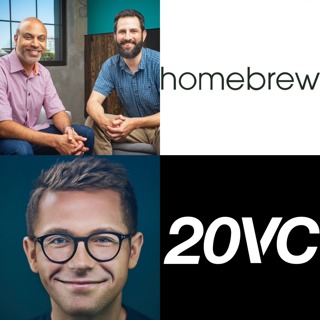
20VC: Homebrew's Hunter Walk and Satya Patel on Why $100M is Not Enough To Execute a Seed Strategy Today | Why They Decided not to Raise New External Funds | Where Are We in the Cycle & What is Truly F***** | Why Founders Should Take Secondaries Earlier
Hunter Walk and Satya Patel are Co-Founders and Partners @ Homebrew, one of the leading seed funds of the last decade. Following 10 years of stellar returns with investments in the likes of Chime, Plaid, Gusto and many others, they decided to not accept any further LP capital and to only invest their own money moving forward through Homebrew Forever. In Today's Discussion on Homebrew We Breakdown: 1. ) The Foundings of a Great Partnership: What was the moment when Hunter and Satya decided they were going to go out and raise their first fund with Homebrew I? What are the core principles that all founding partners need to align on before they start a firm together? What questions should they ask of each other? Why does being independently wealthy coming into a partnership make the partnership easier and more efficient to operate? What changes when the partners have money already? 2.) What Changes When Moving From LP Dollars to Personal Capital: Why did Hunter and Satya decide to not raise any further capital from external LPs? Asset allocation-wise, how did they determine how much is the right amount to set aside for the first 2 years of investing? How many investments do they want to make with that cash? How does investing their personal capital change their deployment pace and cadence? How does it change their approach to reserves management and follow-on financing? How does it change their approach to pricing? How price sensitive are they today? 3.) Analyzing the Seed Landscape Today: Why do Hunter and Satya not think that a $100M seed fund is enough to properly execute a world-class seed strategy today? Who is their competition with the new strategy? How does it change their relationship with large multi-stage funds? How does it change their relationship with seed funds? Do they agree that the last generation of sub $20M micro-funds will not raise another fund in this cycle? How did their entrance impact the seed landscape over the last few years? Why are LPs also to blame for many of the original seed managers raising larger and larger funds? 4.) Companies: Money and People are The Problem: Why has too much money been such a problem for many Homebrew portfolio companies over the last few years? How has too much money changed their execution plans? What happens to the "living dead" companies with many years of runway but no product market fit? Who does this market cater to well? Who will thrive in this market? What have people forgotten about both startups and venture in the last 2 years that we have to remember? Why is this generation so entitled and expectant? Why are startups not a get-rich-quick scheme?
30 Jan 20231h 1min
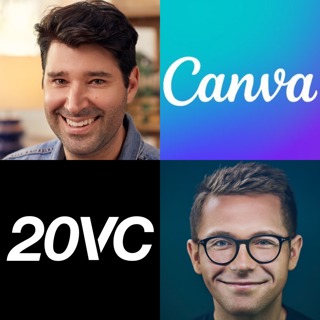
20VC: Canva Co-Founder, Cliff Obrecht on The Journey From 100 VC Rejections to a $40BN Company, Why Good Enough is Not Good Enough, The Secret to Hiring Non-Obvious Talent and Relationships to Money and Why They Are Giving Away Billions
Cliff Obrecht is the Co-Founder & COO @ Canva, the free-to-use online graphic design tool that makes it easy for anyone to design anything from presentations to videos and social media. Cliff and Mel have scaled Canva to over 60 million monthly users, 2,000 employees, and 500,000 teams from companies like Intel and Zoom using Canva. During this incredible growth journey, they have raised over $580M with their last round valuing the company at over $40BN. In Today's Episode with Cliff Obrecht 1.) From Teacher to Billionaire Tech Founder: How did Keith make his way into the world of tech with his founding of FusionBooks? What did the process with FusionBooks teach him about how to run Canva? How did the early fundraising days for Canva go? Why does Cliff think they got over 100 no's? What are Cliff's biggest pieces of advice for founders today, not in Silicon Valley, looking to raise from Silicon Valley VCs? 2.) Scaling to $40BN: The Biggest Lessons: What does Cliff mean when he says the secret to successful hiring is looking for "distance traveled"? How does he determine this in the interview process? What have been some of the single biggest lessons in what it takes to acquire the best talent? What are some of the biggest mistakes Cliff has made in talent acquisition? How has his process changed as a result? What do Canva do to get the best operators as advisors in the company? How do they compensate these advisors? What does Cliff advise founders on how to do the same? 3.) The Art of Deal-Making: How does Cliff think through what makes a "good deal"? How does he approach negotiation? What are the biggest mistakes founders make when negotiating and doing deals? What have been Cliff's biggest lessons on successful investor relations over the years? How does Cliff and Canva approach acquisitions? What do they look for? What is their process? Why do most tech companies approach acquisitions the wrong way? 4.) Cliff Obrecht: Money, Fatherhood and Marriage: How does Cliff analyze his relationship to money today? How much money is enough? How has his relationship to money changed over time? Why have Cliff and Mel given away over $10BN to their foundation? Why is philanthropy so hard to do effectively? Why would Cliff hate for his children to be brought up in excess wealth? What does "great fatherhood" mean to Cliff? What are the most challenging aspects of parenting? What are the secrets to a happy marriage? How does co-founding a company with your other half work well? How does it work poorly?
27 Jan 202350min

20Sales: Why You Should Not Do PLG and Enterprise Sales at the Same Time | How To Move Into Enterprise Sales Gradually | How To Make a Comp Plan For Sales Teams | Why Discounting is Good and Can Be Used with Stevie Case, CRO @ Vanta
Stevie Case is the CRO @ Vanta where she oversees Vanta's go-to-market team to support the company's rapid growth. Prior to joining Vanta, Stevie was Vice President of Mid-Market Sales at Twilio, joining as one of their first account executives, Stevie helped to grow the sales team from a dozen to over 1,000 team members and played a pivotal role in establishing Twilio's enterprise business with key Fortune 500 customers, generating more than $400 million in annual recurring revenue. If that was not enough, Stevie is also a Founding Operator @ Coalition Network and a prominent angel investor. In Today's Episode with Stevie Case We Discuss: 1. ) From World's First Pro Female Gamer to CRO: How did Stevie make her way from pro gamer to CRO? How did her career in gaming make her a better CRO and sales leader? In her early sales career, how did being a single mother with a child impact her approach to sales? What can founders do to make workplaces more inclusive for parents today? 2.) Enterprise or PLG: Which One To Choose: Why does Stevie believe it is not right to do both PLG and enterprise at the same time for startups? How can startups and sales teams move into enterprise selling gradually through testing and without committing a significant budget to an enterprise sales team? How do founders know when is the right time to move from PLG to enterprise? What are the signs? 3.) The Mythical Sales Playbook: How does Stevie define the term "sales playbook" today? What is it not? Should the founder be the person to create the sales playbook? If not them, then who? When is the right time to make your first sales hire? When is the wrong time? 4.) Mastering the Hiring Process in Sales Recruits: How should we structure the interview process for new sales reps? What is the right profile for these first sales hires? How do the best sales talent answer questions and perform in interview processes? How can we really test for grit and curiosity in the interview process? What are the single biggest mistakes founders make when hiring for sales? 5.) Discovery, Discounting, Deal Velocity: With sales cycles being so long, how do you know if enterprise sales reps are good? What is the difference between good discovery vs bad discovery? Should founders engage in discounting to get deals over the line? When does it work?
25 Jan 202348min

20VC: USV's Albert Wenger on What Elon Musk Should Do with Twitter | The State of Crypto Today; The Impact of SBF and Why Now is the Best Time To Invest in Crypto | Are We Too Late to Save The Climate and Why Civil Disobedience is Required | Will TikTok b
Albert Wenger is a managing partner at Union Square Ventures, one of the most successful venture firms of the last decade with a portfolio including Coinbase, Twitter, Twilio, Etsy, and many more. Before joining USV, Albert was the president of del.icio.us through the company's sale to Yahoo and an angel investor (Etsy, Tumblr). He previously founded or co-founded several companies, including a management consulting firm and an early-hosted data analytics company. In Today's Episode with Albert Wenger We Discuss: 1.) From Failed Startup Founder to Leading VC: How Albert transitioned from being a failed entrepreneur to being one of the most respected venture investors with USV today? What were the clear signs for Albert that he was not a good entrepreneur? Why does Albert believe this downturn is different compared to the dot-com bubble? Why was there more hope and promise coming out of the dot-com bubble? 2.) Income Inequality, The Rise of Depression & The Role of Politics: Why is income and wealth inequality more concerning than ever? Why does Albert believe universal basic income is the right solution? Why is mental health worse than ever? What can be done to improve this? Why are our politicians failing us? What should our politicians be doing? How does the rise of Trump show us what society is looking for in politicians? 3.) Climate Change: Misnomers, Developing Countries, Civil Disobedience: What are the single biggest misnomers people have when it comes to climate change? How can we shift spending on climate change solutions from 5% of GDP to 50%? Is that possible? Why do developing nations have an advantage when implementing climate change solutions over more developed economies? Why is civil disobedience the right course of action to ensure society is on a path to change our approach to climate change? 4.) Crypto and Central Banks: The Future of Finance: Why does Albert believe that over the past few years, for many, crypto was a good hedge against inflation? How damaging does Albert believe SBF and FTX will be to crypto in the long term? How does Albert evaluate the potential for governments to create a "central bank digital currency"? What would Albert like to see in a potential currency like this? How could stable coins be the solution to this? What is Albert fearful of with central bank digital currencies? Why does Albert believe now is the best time to be investing in crypto? 5.) The Future of Social Media: Twitter & TikTok: What does Albert believe is wrong with Twitter today? Why was the blue check mark such a mess? What does Albert believe Elon should do with Twitter from this point on? How should Elon deal with the debt providers he has? What happens to Twitter moving forward? Why is it so hard to kill? What is the future of TikTok? Will it be banned in the US? How concerned should the consumer be concerning their data being shared with the Chinese Government?
23 Jan 202345min
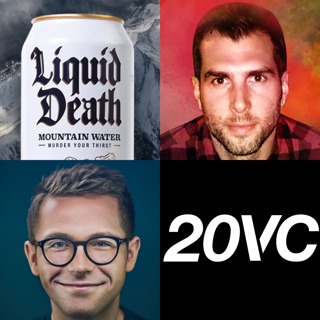
20VC: Turning Canned Water into a $700M Media and Health Company, What Makes Truly Great Brands, How Founders Can Build Their Brand From Day 1 Today & How to Create Viral Content with Little to No Budget with Mike Cessario, Founder and CEO @ Liquid Death
Mike Cessario is the Founder and CEO @ Liquid Death, the man hacking the healthy beverage market with the first hilarious water brand. It is working, Liquid Death's latest valuation was over a staggering $700M and Mike has raised over $200M since founding the company from the likes of Science Inc. Away's Jen Rubio, Dollar Shave Club's Michael Dubin, Swedish House Mafia and Tony Hawk to name a few. Prior to founding Liquid Death, Mike was in the advertising industry at a number of dirrect firms including VaynerMedia. In Today's Episode with Mike Cessario We Discuss: 1.) From Canned Water to $700M Business: How did rockstars' hydration problems lead to the founding of Liquid Death? How did growing up with guns and heroine needles around him at school, impact how Mike sees the world today? What is he running from? What is he running towards? Everyone said, "canned water, that is a stupid idea". What does Mike tell to all entrepreneurs who are told their idea is stupid? How does Mike advise on picking your idea? 2.) How to Build a Truly Great Brand: What does the term "brand" mean to Mike? What does he mean when he says, "truly great brand transcends functional value"? What are the single biggest mistakes Mike sees founders make today on branding? Why does Mike believe people will always hate your brand, if it is good? What are the biggest brand mistakes Mike has made with Liquid Death? What brand does Mike most respect and admire? Why that brand? 3.) Marketing: The Secret to Reaching Millions of People with Little Budget: How does the Liquid Death team come up with the ideas they have for content? Why does Mike believe the label "storytelling" is kinda BS? Why does Mike believe people will always hate your marketing? What was Mike's biggest lesson from their Superbowl commercial with kids drinking Liquid Death, looking like beer? How does Mike decide which channel to prioritise? How has the rise of TikTok and short form video changed their approach to content? How does Mike approach resource allocation for new pieces of content? Do they spend big on few bits of content or spend little on many and see what works?
20 Jan 202346min

20Growth: When To Make Your First Growth Hire? How To Structure the Hiring Process for Growth? Five Core Things the Best Growth Hires Do in the First Week? What to Expect New Growth Hires to Achieve in the First 30 and 90 Days with Hila Qu, Growth Advisor
Hila Qu is one of the leading growth execs of the last decade. Hila helped scale Acorns from 1 million to 5 million users as their VP of growth. Hila then joined GitLab, where she launched their PLG motion (on top of an established sales motion), and built their first-ever growth team. Today Hila is an advisor to amazing companies like Replit and funds like Mucker Capital, Openview and First Round Capital. In Today's Episode with Hila Qu We Discuss: 1.) From Biology and Explosions to Growth: How Hila made her way into the world of growth with growthhackers.com? What are 1-2 of the biggest takeaways from her time with Acorns and Gitlab? How do B2B growth orgs compare to B2C growth orgs? What is different? What is the same? 2.) WTF is Growth? When? How & Why: How does Hila define growth today? What is it not? When is the right time for early-stage founders to hire their first growth hire? Why does Hila always look for data analysts in this first growth hire? From a data standpoint, what should founders have ready and accessible for their first growth hire to have access to and learn from? Is Google Analytics enough? 3.) Hiring Your First Growth Hire: How should early-stage founders structure the hiring process for the first growth hire? What do the best growth job descriptions include? What do they not include? Once applications are in, how does Hila advise founders screen for the best candidates? How should founders structure the interview process post-screening? What are the must-ask questions? Who is involved in the interview process? What are some red flags? 4.) The Master of Onboarding: What should new growth hires want to achieve in the first week? What should they want to complete in the first month? In the first quarter, what do the best candidates have completed? What can founders do to set their growth hires up for success in the best way at this time? 5.) Growth Models, North Stars, Activation and Onboarding and Key KPIs: What really is a growth model? How do founders and growth teams create one? How does Hila advise founders on how to pick the right North Star Metric to focus on? Why are activation and conversion Hila's two favorite growth metrics? What are growth loops? What are growth funnels? How do they work together?
18 Jan 202351min
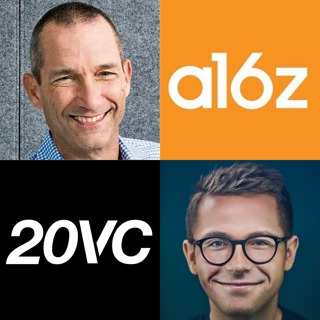
20VC: a16z's Jeff Jordan on The Ultimate Guide to Investing in Marketplaces, Two Core Features to Look for in All Marketplace Investments, Why Fragmented Supply is so Important & Lessons from Airbnb, Pinterest and Instacart on What Makes the Best Cohorts
Jeff Jordan is a General Partner @ a16z where he serves on the boards of Airbnb, Incredible Health, Instacart, Lookout, and Pinterest, just to name a few. Before a16z, Jeff was CEO OpenTable, where he led the company during a period of hyper-growth and oversaw its IPO. Prior to OpenTable, Jeff was Senior VP and General Manager of eBay North America where he oversaw eBay's early growth into one of the Internet's leading commerce brands. In this role, he drove the successful acquisitions of PayPal and Half.com and went on to become President of PayPal, where he was responsible for establishing the company as the global standard for online payments. In Today's Episode with Jeff Jordan We Discuss: 1.) From Taking Opentable Public to Being a GP @ a16z: What led to Jeff making the jump from CEO @ Opentable to becoming a GP at a16z? How does Jeff believe his operating career impacted how he thinks and acts as an investor today, both positively and negatively? What is his 1 biggest learning from eBay and then Opentable that has really shaped his mindset today as an investor? How did those experiences impact what he looks for in companies? 2.) The Two Core Features To Look For in Marketplaces: Fragmentation of supply side: Why does Jeff look for fragmented supply sides? Does this not take longer and is more expensive? How fragmented is fragmented enough? What are the most common reasons founders fail to acquire a fragmented supply side? Intelligent Lead Generation: What does Jeff really want to see in the way that new marketplaces acquire their customers? How does this change with the rise of TikTok and short-form video? What are some other really core features or traits that excite Jeff when he sees them in an early marketplace? What are some massive red flags for Jeff when he sees them early? 3.) How to Acquire and Retain the Demand Side of a Marketplace: Messaging and Brand: What are the biggest lessons Jeff has on how to craft the messaging of a marketplace to make it resonate with the target consumer? What are Jeff's biggest lessons from working with Brian Chesky on how they craft their messaging at Airbnb? What works? What does not work? Perfect Customer Cohorts: What does Jeff most want to see when examining prospective marketplace investment cohorts? What do the best have? What is the sign of a truly retained user in a marketplace? What is a good date duration to measure retention against? What are the biggest mistakes founders make presenting their cohorts? Lessons from Instacart: What are Jeff's biggest lessons from being on the Instacart board on cohorts? What makes good cohorts? How cohorts can seem bad but be good? 4.) Growth vs Profitability, CACs and LTV: Uber, OfferUp, Instacart, Deliveroo, respectfully, the level of profits these businesses are able to drive is questionable, why does Jeff believe marketplaces are good investments still? Many marketplaces start with poor unit economics, how does Jeff think about having the mental plasticity to project out to a time when unit economics could be better? Does Jeff pay attention to CACs at all? When are they important? When are they not? How can they be misleading? What is the best way for founders to present their CACs? 5.) It's Time to VC: Jeff Jordan: The Board Member What are the single biggest misalignments between VCs and their founders? How would Jeff describe his style of board membership today? How has it changed with time? What is the best way to deliver hard feedback as a board member? What are the biggest mistakes board members make? What does Jeff advise young board members today? What are the single best and worst changes that have happened at a16z in the last 24 months?
16 Jan 202345min
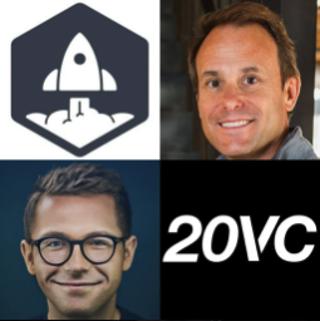
20VC: WTF is Going On in VC? Are VCs Still Investing? How Has What VCs Want in Investments Changed? Are LPs Investing in New Funds? Why VCs That Invest in Public Markets Are Losers? Dec 2023; Will It Be Better Or Worse with Jason Lemkin
The question is: "are VCs still investing?". Today we are joined by Jason Lemkin; one of the OGs of SaaS of the last decade. As the Founder of SaaStr, he has inspired more SaaS founders than one can imagine building "The World's Largest Community for Business Software." Jason also invests out of the $100M SaaStr Fund and in the past Jason has led rounds into TalkDesk, Pipedrive, Algolia, Gorgias, Salesloft, and many more incredible companies. Prior to founding SaaStr, Jason was the Co-Founder of Echosign, an early e-signature business, funded by Emergence Capital and that was acquired by Adobe for $100M. In Today's Episode on "Are VCs' Still Investing" We Discuss: 1. What Does it Take To Get Funded Today: Early-Stage: How has what VCs want in early-stage investments changed in this new environment? Should startups prioritize growth? Profitability? Capital efficiency? How long a runway is sufficient enough for founders to feel comfortable? Why does Jason believe most founders are still deluded that they are fundable? Growth Stage Companies: Is the growth stage totally dead? What will we see happen to all the companies that raised $50M+ at large valuations that have very little revenue? Why does Jason believe that any operator who joined a $BN company in the past few years will not make any money on their equity? What should they do now? Will we start to see down rounds and structured rounds at the growth stage? If so, when? Public Markets: Why does Jason believe this is a time unlike any he has seen before? Are we in full recession now in Jason's mind? In Dec 2023, will this be better or worse? Which are the most under-priced assets in the public markets today? Why does Jason believe VCs investing in public markets are losers? 2. Micro Funds Will Be Decimated and LP Behaviour in 2023 Why does Jason believe that micro-funds in 2023 will be decimated and unable to raise new funds? How will the majority of LPs approach new fund investments? How will LPs approach re-investing in their existing managers? How has what they need to see changed? 3. Marketing and Sales: We Need To Change Budgets and Targets How should CEOS be changing their marketing budgets in 2023? What are the single biggest mistakes CEOs are making in this downturn with regard to their marketing budget? How do sales targets need to be amended in the face of changing buying patterns? How do the best sales and marketing leaders respond to these changing budgets and targets? How do the worst respond?
13 Jan 202349min






















